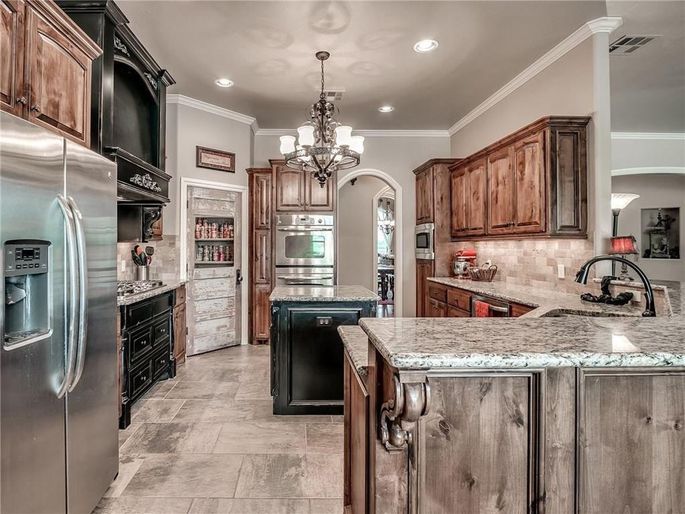A $1 house listed in Edmond, OK, has stirred up a huge hubbub among home buyers, home sellers, real estate agents, and others: Come on, is that even real? There must be a catch.
So, of course, we had to find out what’s up.
For starters, the listing price is not an error; it really is one buckaroo. And as the pics below show, the house is gorgeous as all get-out. It’s 4,000 square feet of magnificence with four bedrooms, four baths, a swimming pool, and so much more on a 2-acre lot.
Based on comps and other data, the house is valued at about $413,000.

If there’s any “catch” to be found, it’s that, as most people know, a home’s asking price is rarely where it ends up; that all depends on what a buyer is willing to offer. And if there are multiple buyers because the home is garnering tons of attention, this can kick-start a bidding war that can drive up the final sum to whatever the market can bear.
That’s exactly what these home sellers—Dan and Sharla Bradley—were hoping would happen.
“I often tell sellers that we could price their home for a dollar and the market would determine what the sales price should be,” explains the home’s listing agent, Ryan Hukill at Keller Williams. “This time, I had some sellers who were bold enough to take me up on trying that theory out.”
So did it work? Well, let’s just say that their first open house—scheduled on a Sunday two days after the listing went live—reeled in around 60 buyers. Seven submitted bids by the deadline of noon on Tuesday.
In other words: After less than a week, the home is under contract. While Hukill won’t share specifics until the deal is officially done, he says, “we ended up a little bit above what the sellers initially thought they’d get.”
Which begs the question: Should more home sellers consider pricing their home at $1?

$1 home listings: ‘It’s a big risk’
While it sounds insane, it’s not unprecedented—and other agents agree that home sellers who try it may see bigger and better returns than if they price their home high to start.
“It’s an excellent strategy that I’ve recommended in the past. With the right marketing, this will make your home the talk of the town,” says real estate agent Cedric Stewart with Keller Williams, in Washington, DC. “Auction-style bidding draws something out of people and often causes them to pay slightly more than they normally would.”
Nonetheless, “most sellers are afraid to take such a risk,” Stewart adds, conceding that this approach does come with some pitfalls.
For one, in the same way Black Friday deals bring out the rabid bargain hunters, sellers could be deluged with lowballers, looky-loos, and other less serious candidates who’ll only clog up the process.
“Many of the buyers may be unqualified and submitting offers that are not worth consideration,” warns William Fastow, a real estate agent with Sotheby’s in the Washington, DC, area. “These junk offers all legally have to be presented to the owner by the listing agent and detracts from the agent’s time and resources, crowding out legitimate buyers.”
This sales gimmick might also drive away legitimate buyers.
“Imagine you are in the market for this home and you arrive to the open house and it’s flooded with people,” Fastow adds. “The agent announces proudly that they have 15-plus offers. If you’re a serious buyer, is this really a situation you want to get involved in?”

Some real estate experts say the downsides of $1 homes go far beyond fending off bargain hunters.
“This is a horrible idea for one overriding reason that has nothing to do with the strategy, but rather with the technology that people use to find listings,” says Kevin Deselms, a real estate agent with Re/Max Alliance in Golden, CO. “Most people will search for homes in a price range that’s comfortable for their financial situation. The vast majority of those searches will not have a $0 minimum limit. The buyer will want to focus on a range that represents their budget. This will leave the $1 listing out of a whole lot of people’s search results.”
Yet there are things you can do to mitigate some of these risks.
“Make sure to consult an experienced real estate consultant and an attorney to make sure all bases are covered,” Stewart says. “To avoid sellers getting sued by unrealistic deal seekers, it’s imperative to set a reserve price and very clear rules about how the sale will take place. It should be understood that the seller has the right to accept or reject any offer. If the bids end up being low, the sellers shouldn’t be expected to sell.”

Even Hukill isn’t so sure he’d try this $1 sales tactic again.
“I definitely felt like we got some tire kickers, and a lot of jokesters saying they’d pay me $100 or $1,000,” Hukill tells realtor.com. Another surprising downside: “Even serious buyers didn’t know what to offer, or where to start.”
But overall, “I’ve gotten a lot of comments along the lines of ‘This is a brilliant idea, why didn’t I think of that before?’ I don’t know if it’s brilliant, but it’s a conversation I’ve been having with sellers for 10 years,” he concludes. “And these sellers are very happy; they had a lot of fun with it. They were excited to try something different.”
